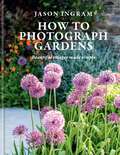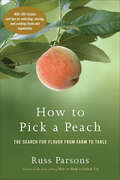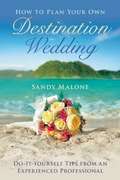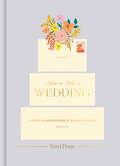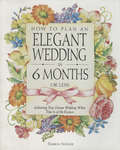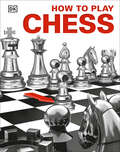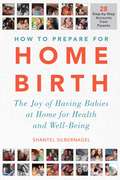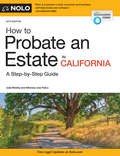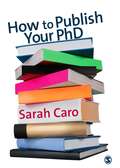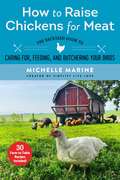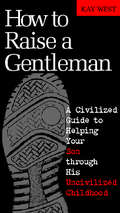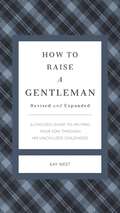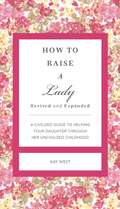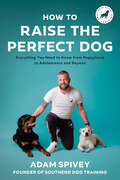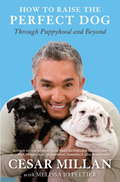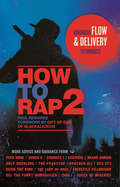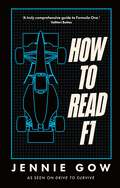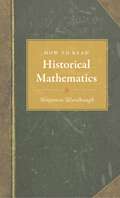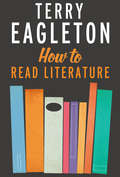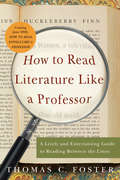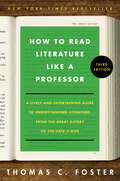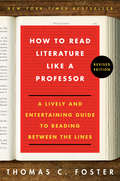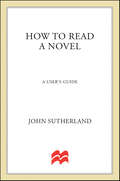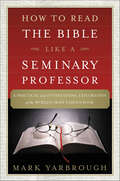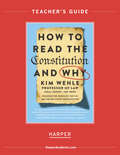- Table View
- List View
How to Photograph Gardens: Beautiful images made simple
by Jason IngramLearn how to take spectacular shots of every type of garden, all year round, with this definitive guide.Whether you want to create professional images of your own garden, snap Instagram-worthy shots with your iPhone, or learn the best ways to showcase your landscaping business or hobby, this book has it all.Using techniques developed through 25 years of professional success, award-winning photographer Jason Ingram will teach you how to understand light, stabilise photos and skilfully edit images that truly showcase the essence of any garden.ESSENTIAL GEAR AND EQUIPMENT: Gain an overview of the best camera, lenses and accessories to pack in your bag.MASTERING LIGHT: Explore the methods for manipulating natural light, from beginner to advanced.COMPOSITION TIPS AND TRICKS: Combine styling hacks and camera skills for sensational compositions.ACCESSING PUBLIC GARDENS: Learn how to gain permission to the most magical garden's for photography.POST-PROCESSING AND EDITING: Be introduced to photo editing software that enhance your favourite shots.With clear, concise, and comprehensive instructions suitable for every skill level, this book will guide you through every stage of creating extraordinary garden photographs.
How to Pick a Peach: The Search for Flavor from Farm to Table
by Russ Parsons“Equal parts cookbook, agricultural history, chemistry lesson and produce buying guide, this densely packed book is a food-lover’s delight.” —Publishers Weekly (starred review)Critics greeted Russ Parsons’ first book, How to Read a French Fry, with raves. The New York Times praised it for its “affable voice and intellectual clarity”; Julia Child lauded it for its “deep factual information.”Now in How to Pick a Peach, Parsons takes on one of the hottest food topics today. Good cooking starts with the right ingredients, and nowhere is that more true than with produce. Should we refrigerate that peach? How do we cook that artichoke? And what are those different varieties of pears? Most of us aren’t sure. Parsons helps the cook sort through the produce in the market by illuminating the issues surrounding it, revealing intriguing facts about vegetables and fruits in individual profiles about them, and providing instructions on how to choose, store, and prepare these items. Whether explaining why basil, citrus, tomatoes, and potatoes should never be refrigerated, describing how Dutch farmers revolutionized the tomato business in America, exploring organic farming and its effect on flavor, or giving tips on how to recognize a ripe melon, How to Pick a Peach is Parsons at his peak.“The lust for local flavor finds an eloquent spokesman in Russ Parsons . . . How to Pick a Peach is his answer to the somber reality of the supermarket produce section.” —The New York Times
How to Plan Your Own Destination Wedding: Do-It-Yourself Tips from an Experienced Professional
by Sandy MaloneTen years ago, when Sandy Malone was planning her Caribbean destination wedding, there was no Pinterest, no Instagram, and no Wedding Wire. The Knot and the Wedding Channel were in their infancy. And Malone was planning her wedding from scratch.The tips and advice in How to Plan Your Own Destination Wedding will help brides and grooms navigate the murky waters of destination-wedding planning—and they are murky because most do-it-yourself brides and grooms are looking to do something “different” from what all of their friends have done before them. Unfortunately, the more remote, bizarre, and challenging the destination is, the more attractive it appears to the do-it-yourself couple.That’s where Sandy Malone, star of Wedding Island (TLC), who has been planning weddings for ten years, comes in. She offers advice to brides and grooms on how NOT to spend money on things they don’t need to invest in, and where they DO need to spend money to make sure the event runs smoothly. She also gives tips on how to negotiate the contract with the venue, the “wetiquette” of invitations for destination weddings, finding and handling vendors abroad, and much more. This book offers the complete guide to destination weddings, by a true expert!
How to Plan a Wedding: A Month-by-Month Guide for Modern Weddings
by Terri PousTake the stress out of wedding planning with this month-by-month guide that simplifies the ins and outs of saying I do!Whether you&’re eloping at city hall or throwing a reception for all of your friends and family to attend, How to Plan a Wedding is a checklist-in-a-guide that helps you knock out to-dos and divvy up tasks so you can enjoy every minute of your engagement, based on a twelve-month countdown that can be condensed or expanded to fit your needs. Start with the wedding style quiz and then take this book to every venue visit (that&’s in month one), vendor appointment (month three), tasting (month four), and fitting (month ten). You can even bring it along for the ride to your bach party (plan that in month seven).With inclusive tips for LGBTQ+ couples and multicultural ceremonies, How to Plan a Wedding encourages you to choose the things you actually want at your wedding and skip those that don&’t matter. After all, this day is for the two of you—tie the knot however you wish!
How to Plan an Elegant Wedding in 6 Months or Less: Achieving Your Dream Wedding When Time Is of the Essence
by Sharon NaylorPlan the Perfect Wedding In Half the Time!It really is possible to take care of the countless details and madness leading up to your big day and create the event you always envisioned--even with the clock ticking. And you can enjoy doing it!Wedding expert Sharon Naylor gives an array of creative tips, clever shortcuts, and priceless secrets to make planning your wedding seamless. You will discover how to:·Save time and money and reduce stress while maintaining elegance ·Organize and prioritize for maximum efficiency ·Find the perfect ceremony and reception locations on short notice ·Have fun and enjoy planning under a time constraint ·And much, much more!"A smart, comprehensive guide to planning a wedding quickly and easily. Every engaged couple should own this invaluable resource!" --Diane Forden, editor in chief, Bridal Guide MagazineFrom the Trade Paperback edition.
How to Play Chess
by DKLearn chess the fun way and add firepower to your chess strategies with this beginner&’s guide to the world's most popular game of skill. From the opening move to checkmate, How to Play Chess is an easy-to-follow guide to achieve grandmaster greatness. Perfect for children aged 8–13, this companion explains chess tactics and strategies in simple language supported by amazing 3-D images. Starting with basic terms and techniques, this book will make you a chess champion and teach you master tips to impress your opponents. The book begins with a short history of chess and also explains the basic rules and objectives of the game. It contains descriptions of popular moves and the reference section illustrates the moves of one of the most famous chess games – the Opera Game played by the Duke of Brunswick in 1858. Grab a copy of How to Play Chess and learn to solve the toughest of chess challenges.
How to Prepare for Home Birth: The Joy of Having Babies at Home for Health and Well-Being
by Shantel SilbernagelFor First-, Second-, or Third-Time Moms, Single Parents, Same-Sex Parents, and More—This Isn&’t Your Typical &“Birth Story&” Book! With an exciting collection of personal narratives, How to Prepare for Home Birth sheds light on the varied and fascinating experiences of women choosing home birth. Anyone even remotely interested in home birth will want to pull up a chair and witness one of the most intimate moments in each family&’s life. From the redwoods of California to a converted cowshed in Ireland, readers will be not only entertained, but also exposed to what home birth really feels, looks, and sounds like. Topics include:First-time home birthHome birth after hospital birthHome birth after Cesarean sectionPostpartum adviceAnd so much moreExpectant parents will come away with a deep understanding and sense of security, knowing that if others have done this, they can, too.
How to Probate an Estate in California
by Julia Nissley Lisa FialcoHandle probate yourself - and save time and money When you've lost a loved one, the inevitable legal matters can seem difficult and confusing. But in most cases, probate involves little more than routine paperwork to transfer assets to family members and other beneficiaries. How to Probate an Estate in California explains, step-by-step, how to wrap up a basic estate. Whether you do it yourself or work with a lawyer, you'll save money and time. With this easy-to-follow guide, you'll learn how to: read and understand a will or trust determine who inherits if there is no will pay bills and taxes complete and file all necessary court paperwork collect life insurance and other death benefits transfer real estate, securities, vehicles, and other assets to heirs and beneficiaries transfer some assets without probate Even if you hire a lawyer to do some of the paperwork, this book demystifies the process so that you can make informed decisions and communicate intelligently with the attorney about the estate--and save cash in the process. Why pay a lawyer over $15,000 to probate a $500,000 estate, when you can do much of it on your own? Every page of this new edition has been reviewed and revised by a practicing probate lawyer. It provides fresh and accurate information about probating an estate in California.
How to Publish Your PhD
by Sarah CaroHow to Publish Your PhD is the first book to provide emerging researchers with a comprehensive and authoritative guide to publishing their research. Drawing on nearly twenty years in the book business Sarah Caro explains in a clear and accessible way the key issues facing the would-be author. Within the context of today's fast changing world where new technologies and increasing globalization continue to impact on academia and the world of academic publishing, key issues are discussed ranging from whether publishing your PhD is always the best way to enhance your career prospects to whether you should focus on journals or books. A wealth of practical information and advice is included on: choosing a publisher revising your thesis putting together a proposal surviving the review process negotiating a contract working with your publishers marketing department. The book is designed to be an easy to use, one stop guide with examples, chapter summaries and further reading. It will be an invaluable resource for emerging researchers across the broadest range of the humanities and social sciences and for all those teaching and advising them, in Europe and the US. 'Every PhD student should buy a copy of How to Publish your PhD before and not after they enrol for a doctoral degree. Informative, practical and insightful, Sarah Caro will become the mentor of every successful PhD student. A mine of information and practical advice, this text is the definitive nuts-and-bolts manual on how to do it. A safe and sure guide' - Bryan S. Turner, Alona Evans Distinguished Visiting Professor, Wellesly College
How to Raise Chickens for Meat: The Backyard Guide to Caring for, Feeding, and Butchering Your Birds
by Michelle MarineIf self-sufficiency and raising your own food is important to you, this book will help you pull together a complete farm-to-table experience. Gone are the days when grandma headed to the chicken coop in search of dinner. In this day and age, when fewer and fewer people know where their food comes from, How to Raise Chickens for Meat helps families take control of their food supply once again. Divided into four easy-to-navigate sections,How to Raise Chickens for Meat is packed with practical information. The first section, Getting Started, includes information on breed specifics, timing, and quantity. This section will help you analyze options and make informed decisions as you get started. The second section, Care & Feeding, dives into the specifics of keeping your flock healthy. Learn how to set up a brooder, what to feed your chickens, how to safely pasture them, and how to keep your flock stress-free. The third section, Butchering, prepares you for one of the more challenging parts of raising chickens for meat. It addresses some of the emotions you may feel along with the actual process of butchering and provides practical tips to make it easier. It also discusses alternative options if you don&’t want to process your own chickens. The book concludes with cooking tips and delicious tried and true farm-to-table recipes to impress even the most doubtful family member! How to Raise Chickens for Meat is the resource your homestead library has been missing.
How to Raise a Gentleman
by Kay WestHow to Raise a Gentleman is an invaluable resource for parents whohope their little boys will grow up to be the kind of men who know which fork touse, how to treat others, and will generally make their parents proud.How to Raise a Gentleman focuses on real-life topics such as: being agood sport, play dates, and - especially for boys - "personal habits:farting, belching, boogers, and scratching." The book includes: Personal stories pertaining to each topic Suggestions for the age at which a parent should introduce a child to certain rules Helpful ideas in easy-to-remember phrases And suggestions that parents can follow to "teach by example"
How to Raise a Gentleman: A Civilized Guide to Helping Your Son Through His Uncivilized Childhood (The GentleManners Series)
by Candace Simpson-GilesSomewhere amid the tangle of video game controllers and muddy sneakers, there's a nice boy. And somewhere within that nice boy is a gentleman just waiting to emerge. For at least eighteen years, you'll have the pleasure of coaxing him out, little by little. You'll make sure he knows how to act at a formal dinner, and you'll explain to him that answering a telephone should never involve the words "yeah" or "hang on." And eventually, you'll be confident that he can react maturely when his team loses in overtime or when he meets a girl he likes. He'll know which fork to use, how to dress on an airplane, and when it's appropriate to speak up for himself and others. Let Kay West guide you through his transformation from boy to gentleman, and watch his young life flourish.
How to Raise a Lady Revised & Updated: A Civilized Guide to Helping Your Daughter Through Her Uncivilized Childhood (The GentleManners Series)
by Kay WestThe day she was born, you dreamed of all that lay ahead. Youenvisioned a gracious young girl--the sort of daughter other parents admire--one who knowshow to make charming conversation and when to hold her tongue. Polite and considerate,your daughter would know exactly how to behave, whether she was at the balletwith her grandmother or in the stands at a Friday night football game. But thattiny pink bundle wasn't born knowing the finer points of being a lady. Sheneeds your guidance . . . because honestly, she'll never know how much perfumeis too much or how much gratitude is too little if you don't explain. Explorethese timeless fundamentals of grace, thoughtfulness, and appropriate behavior,and pass along the lessons to your young lady in-the-making.
How to Raise the Perfect Dog: Everything You Need to Know from Puppyhood to Adolescence and Beyond A Puppy Training and Dog Training Book
by Adam SpiveyThe ultimate no-bullsh*t guide to raising and training your puppy in the first year, with straight-talking advice from the trainer behind social media sensation Southend Dog TrainingThe first twelve months or so of a dog&’s life are the hardest work, but Southend Dog Training founder Adam Spivey can help. In this handy guide to your puppy&’s first year, he teaches you everything you need to know to understand your dog and help you both thrive. He shares essential guidance on:• The top five dog breeds for a first-time owner and what to know about temperament • What to buy (and not buy) to prepare your home for a puppy• Crate training, puppy potty training, and bedtime routines• Basic training and leash walking• Socialization, puppy separation anxiety, and more! Adam says:My simple, straight-talking approach takes all the nonsense out of dog training and puts your dog at the center of everything you do. You&’ll hear me say again and again that I like to train the dog that&’s in front of me, not follow a set of rules or guidelines that might not even apply to your puppy, and that&’s what you&’ll find here. Because for me, the dog always comes first.
How to Raise the Perfect Dog: Through Puppyhood and Beyond
by Cesar Millan Melissa Jo PeltierFrom the bestselling author and star of National Geographic Channel's Dog Whisperer, the only resource you’ll need for raising a happy, healthy dog. For the millions of people every year who consider bringing a puppy into their lives–as well as those who have already brought a dog home–Cesar Millan, the preeminent dog behavior expert, says, "Yes, you can raise the perfect dog!" It all starts with the proper foundation in the early years. Here, Cesar tells you everything you need to know to create the best environment for a well-balanced dog in order to avoid behavior issues in the future, and shows you how to correct the most common behavior issues for young dogs. Based on Cesar’s own detailed experiences raising individual puppies from some of the most popular breeds, How to Raise the Perfect Dog is like having Cesar right beside you, as your own personal expert, coaching you and your dog from the first day of your life together. Packed with new information aimed specifically at the particular needs of puppies and adolescents, and written in Cesar's friendly, accessible style, How to Raise the Perfect Dog answers all the most commonly asked questions and guides you towards a loving, satisfying life-long relationship with your best friend. #1 New York Times bestselling author, Cesar Millan shows you how to raise the perfect dog and prevent behavior issues before they start, including:• what to expect from each stage of your puppy's development• quick and easy housebreaking• the essentials of proper nutrition• the importance of vaccinating–and of not over-vaccinating• creating perfect obedience from day one through rules, boundaries, and calm-assertive leadership• how to avoid the most common mistakes owners make raising puppies and young dogs• how to correct any issue before it becomes a problem• unique exercises and play to bring out the best in every breedFrom the Hardcover edition.
How to Rap 2: Advanced Flow and Delivery Techniques
by Paul Edwards Gift Of GabIn this sequel to How to Rap, techniques that have not previously been explained--such as triplets, flams, lazy tails, and breaking rhyme patterns--are thoroughly broken down and examined, arming readers with additional tools for their rapping repertoire. Filled with interviews from hip-hop's most innovative artists, including Tech N9ne, Crooked I, Pharcyde, Das EFX, Del the Funky Homosapien, and Big Daddy Kane, this book takes you through the intricacies of rhythm, rhyme, and vocal delivery, delving into the art form in unprecedented detail. This work is a must-read for MCs looking to take their craft to the next level, as well as anyone fascinated by rapping and its complexity.
How to Read F1: Everything you need to know about racing in the fast lane
by Jennie Gow'Formula 1 is as complex as it is competitive, existing in a world which has built up a language almost unique to itself. Jennie has been working the Formula 1 pitlanes and paddocks of the world since before many of today’s superstars had even started karting. She knows the sport inside out. There’s nobody better to take you on this alphabetic adventure through the greatest sport in the world.' Will Buxton'This is a great read for old and new fans of F1, one that will inform, educate and entertain you. A truly comprehensive guide to Formula One - from A to Z (and most importantly, to B).' Valtteri Bottas'Jennie's job is to go where angels fear to tread. Being in the pit lane and on the grid or even in the F1 paddock is not for the faint of heart. It takes courage and a lot of hard work to know your stuff and ask the difficult questions in F1. Jennie Gow is that gal!' – Damon Hill'Jennie brings such a great passion to broadcasting on F1.' – Nico RosbergFun, informative and insightful, How to Read F1 is the perfect gift for Formula One fans.BBC F1 presenter and Drive to Survive expert Jennie Gow covers the key concepts, drivers, teams, tech and rules in an easy-to-read, bitesize format. Featuring bespoke illustrations capturing the sport's famous faces and technical elements, the book is packed with Jennie's unique insights, anecdotes and plenty of trivia. Whether you’re new F1 and keen to learn more or a veteran supporter looking to brush up on facts, there’s something for everyone in this entertaining guide to racing in the fast lane.
How to Read Historical Mathematics
by Benjamin WardhaughTechniques for deciphering texts by early mathematiciansWritings by early mathematicians feature language and notations that are quite different from what we're familiar with today. Sourcebooks on the history of mathematics provide some guidance, but what has been lacking is a guide tailored to the needs of readers approaching these writings for the first time. How to Read Historical Mathematics fills this gap by introducing readers to the analytical questions historians ask when deciphering historical texts.Sampling actual writings from the history of mathematics, Benjamin Wardhaugh reveals the questions that will unlock the meaning and significance of a given text—Who wrote it, why, and for whom? What was its author's intended meaning? How did it reach its present form? Is it original or a translation? Why is it important today? Wardhaugh teaches readers to think about what the original text might have looked like, to consider where and when it was written, and to formulate questions of their own. Readers pick up new skills with each chapter, and gain the confidence and analytical sophistication needed to tackle virtually any text in the history of mathematics.Introduces readers to the methods of textual analysis used by historiansUses actual source material as examplesFeatures boxed summaries, discussion questions, and suggestions for further readingSupplements all major sourcebooks in mathematics historyDesigned for easy referenceIdeal for students and teachers
How to Read Literature
by Terry EagletonWhat makes a work of literature good or bad? How freely can the reader interpret it? Could a nursery rhyme like Baa Baa Black Sheep be full of concealed loathing, resentment, and aggression? In this accessible, delightfully entertaining book, Terry Eagleton addresses these intriguing questions and a host of others. How to Read Literature is the book of choice for students new to the study of literature and for all other readers interested in deepening their understanding and enriching their reading experience.In a series of brilliant analyses, Eagleton shows how to read with due attention to tone, rhythm, texture, syntax, allusion, ambiguity, and other formal aspects of literary works. He also examines broader questions of character, plot, narrative, the creative imagination, the meaning of fictionality, and the tension between what works of literature say and what they show. Unfailingly authoritative and cheerfully opinionated, the author provides useful commentaries on classicism, Romanticism, modernism, and postmodernism along with spellbinding insights into a huge range of authors, from Shakespeare and J. K. Rowling to Jane Austen and Samuel Beckett.
How to Read Literature Like a Professor
by Thomas C. FosterWhat does it mean when a fictional hero takes a journey?. Shares a meal? Gets drenched in a sudden rain shower? Often, there is much more going on in a novel or poem than is readily visible on the surface--a symbol, maybe, that remains elusive, or an unexpected twist on a character--and there's that sneaking suspicion that the deeper meaning of a literary text keeps escaping you.In this practical and amusing guide to literature, Thomas C. Foster shows how easy and gratifying it is to unlock those hidden truths, and to discover a world where a road leads to a quest; a shared meal may signify a communion; and rain, whether cleansing or destructive, is never just rain. Ranging from major themes to literary models, narrative devices, and form, How to Read Literature Like a Professor is the perfect companion for making your reading experience more enriching, satisfying, and fun.
How to Read Literature Like a Professor 3E: A Lively and Entertaining Guide to Understanding Literature, from The Great Gatsby to The Hate You Give
by Thomas C FosterThoroughly revised and expanded for a new generation of readers, this classic guide to enjoying literature to its fullest—a lively, enlightening, and entertaining introduction to a diverse range of writing and literary devices that enrich these works, including symbols, themes, and contexts—teaches you how to make your everyday reading experience richer and more rewarding. While books can be enjoyed for their basic stories, there are often deeper literary meanings beneath the surface. How to Read Literature Like a Professor helps us to discover those hidden truths by looking at literature with the practiced analytical eye—and the literary codes—of a college professor.What does it mean when a protagonist is traveling along a dusty road? When he hands a drink to his companion? When he’s drenched in a sudden rain shower? Thomas C. Foster provides answers to these questions as he explores every aspect of fiction, from major themes to literary models, narrative devices, and form. Offering a broad overview of literature—a world where a road leads to a quest, a shared meal may signify a communion, and rain, whether cleansing or destructive, is never just a shower—he shows us how to make our reading experience more intellectually satisfying and fun.The world, and curricula, have changed. This third edition has been thoroughly revised to reflect those changes, and features new chapters, a new preface and epilogue, as well as fresh teaching points Foster has developed over the past decade. Foster updates the books he discusses to include more diverse, inclusive, and modern works, such as Angie Thomas’s The Hate U Give; Emily St. John Mandel’s Station Eleven; Neil Gaiman’s Neverwhere; Elizabeth Acevedo’s The Poet X; Helen Oyeyemi's Mr. Fox and Boy, Snow, Bird; Sandra Cisneros’s The House on Mango Street; Zora Neale Hurston’s Their Eyes Were Watching God; Maggie O’Farrell’s Hamnet; Madeline Miller’s Circe; Pat Barker’s The Silence of the Girls; and Tahereh Mafi’s A Very Large Expanse of Sea.
How to Read Literature Like a Professor Revised: A Lively and Entertaining Guide to Reading Between the Lines
by Thomas C. FosterA thoroughly revised and updated edition of Thomas C. Foster's classic guide--a lively and entertaining introduction to literature and literary basics, including symbols, themes, and contexts--that shows you how to make your everyday reading experience more rewarding and enjoyable.While many books can be enjoyed for their basic stories, there are often deeper literary meanings interwoven in these texts. How to Read Literature Like a Professor helps us to discover those hidden truths by looking at literature with the eyes--and the literary codes--of the ultimate professional reader: the college professor.What does it mean when a literary hero travels along a dusty road? When he hands a drink to his companion? When he's drenched in a sudden rain shower? Ranging from major themes to literary models, narrative devices, and form, Thomas C. Foster provides us with a broad overview of literature--a world where a road leads to a quest, a shared meal may signify a communion, and rain, whether cleansing or destructive, is never just a shower--and shows us how to make our reading experience more enriching, satisfying, and fun.This revised edition includes new chapters, a new preface, and a new epilogue, and incorporates updated teaching points that Foster has developed over the past decade.
How to Read a Novel: A User's Guide
by John Sutherland"Do we still know how to read a novel?" John Sutherland, Chairman of the 2005 Booker Prize Committee, asks. His disheartened answer is an unequivocal, "No." But Sutherland has not given up hope. With acerbic wit and intellect, he traces the history of what it used to mean to be well-read and tells readers what it still means today. Using this delightful book as a means to an end, he reminds readers how the delicate charms of fiction can be at once wonderful and inspired and infuriating. On one level this is a book about novels: how they work, what they're about, what makes them good or bad, and how to talk about them. At a deeper level, this is a book in which one of the most intimate tête-à-têtes is described—one in which a reader meets a novel. Will a great love affair begin? Will the rendezvous end in disappointment? Who can say? In order for the relationship to take its appropriate course all the details must be clearly acknowledged and understood for their complexities: plot, point of view, character, style, pace, first and last sentences, and even beauty. Still, Sutherland knows a true understanding of fiction is more than a flirtation with text and style—it is a business. Taking his readers on a trip to the bookshop, he helps them judge a book by its cover based on design and color, wondering aloud what genre might be best, even going so far as to analyze one of the latest American bestsellers to further help the buying reader choose the novel that is right for him or her. In a book that is as wry and humorous as it is learned and opinionated, John Sutherland tells you everything you always wanted to know about how to read fiction better than you do now (but, were afraid to ask).
How to Read the Bible Like a Seminary Professor: A Practical and Entertaining Exploration of the World's Most Famous Book
by Mark YarbroughMany people admire and even revere the Bible, but they simply do not understand what they read, much less how to study Scripture. Yet they wish they could. In this insightful and alternately amusing guide, Professor Mark Yarbrough shows how easy and gratifying it is to unlock the hidden truths of God's Word and to discover a world where reading the Bible doesn't just satisfy our curiosity, but changes our life. To do this, the reader will step into the seminary classroom and observe the practical principles-the tricks of the trade-for becoming a more effective student of the Bible. But Yarbrough has made sure that his writing style and general approach will be appealing to both academic students and those involved in lay-level Bible study. Real life is whacky and in-your-face. Studying Scripture should be too.
How to Read the Constitution--and Why Teaching Guide (Legal Expert Series)
by Kim WehleAn insightful, urgent, and perennially relevant handbook that lays out in common sense language how the United States Constitution works, and how its protections are eroding before our eyes—essential reading for anyone who wants to understand and parse the constantly breaking news about the backbone of American government.The Constitution is the most significant document in America. But do you fully understand what this valuable document means to you? In How to Read the Constitution and Why Now, legal expert and educator Kimberly Wehle spells out in clear, simple, and common sense terms what is in the Constitution, and most importantly, what it means. In compelling terms, she describes how the Constitution’s protections are eroding—not only in express terms but by virtue of the many legal and social norms that no longer shore up its legitimacy—and why every American needs to heed to this “red flag” moment in our democracy.This invaluable—and timely—resource covers nearly every significant aspect of the Constitution, from the powers of the President and how the three branches of government are designed to hold each other accountable, to what it means to have individual rights—including free speech, the right to bear arms, the right to be free from unreasonable searches and seizures, and the right to an abortion. Finally, the book explains why it has never been more important than now for all Americans to know how our Constitution works—and why, if we don’t step in to protect it now, we could lose its protections forever.How to Read the Constitution and Why Now is essential reading for anyone who cares about maintaining an accountable government and the individual freedoms that the Constitution enshrines for everyone in America—regardless of political party.
